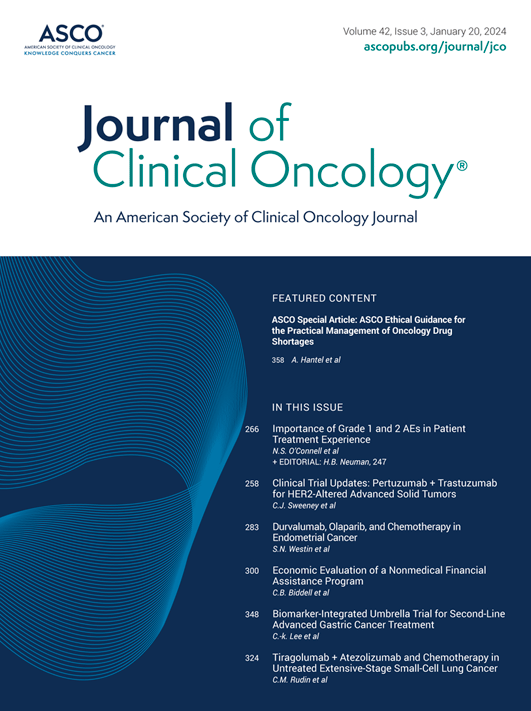National Cancer Institute's Working Group on Biochemically Recurrent Prostate Cancer: Clinical Trial Design Considerations.
IF 41.9
1区 医学
Q1 ONCOLOGY
引用次数: 0
Abstract
PURPOSE Biochemical recurrence (BCR) of prostate cancer (PCa) after definitive surgery and/or radiation (including salvage strategies) is a burgeoning area of clinical research inspired by ultrasensitive next-generation imaging. Most phase III trials in PCa have focused on metastatic disease, defined by conventional imaging. Despite the emergence of new imaging, clinical trial principles from metastatic studies will not optimize future BCR trials. METHODS A Working Group convened at the National Cancer Institute on November 13, 2024 (NCI BCR WG). Key areas of discussion included nomenclature, baseline criteria for data capture, imaging considerations, delineation of high-risk populations to be targeted for trial development, requirements of metastasis-directed therapy (MDT) or hormonal therapy, quality-of-life considerations, and potential study end points. RESULTS The NCI BCR WG defined the novel term "prostate-specific membrane antigen (PSMA)+BCR" to identify the emerging concept of recurrent PCa identifiable only on PSMA positron emission tomography (PET), overlapping with BCR and distinct from metastatic hormone-sensitive PCa as traditionally defined by conventional imaging. The WG suggested defining high-risk BCR with a prostate-specific antigen doubling time of ≤6 months, regardless of PET findings. The WG provided recommendations for baseline data capture and imaging requirements. Neither systemic therapy nor MDT were considered mandatory for control arms. The WG also discussed novel end points and quality-of-life metrics in this disease space. CONCLUSION These discussions should inform future clinical BCR trials in this distinct disease space relative to metastatic disease defined by conventional imaging. The NCI BCR WG strongly advocates that future trials explore deintensification of treatment to minimize toxicity in this relatively indolent disease state.国家癌症研究所生化复发前列腺癌工作组:临床试验设计考虑。
目的前列腺癌(PCa)术后生化复发(BCR)(包括挽救策略)是受下一代超灵敏成像技术启发的一个新兴临床研究领域。大多数前列腺癌的III期试验集中在转移性疾病,由传统影像学定义。尽管出现了新的影像学,但转移性研究的临床试验原则将无法优化未来的BCR试验。方法一个工作组于2024年11月13日在美国国家癌症研究所召开(NCI BCR WG)。讨论的关键领域包括命名法、数据采集的基线标准、影像学考虑、试验开发的高危人群的描述、转移导向治疗(MDT)或激素治疗的要求、生活质量考虑和潜在的研究终点。结果NCI BCR工作组定义了新的术语“前列腺特异性膜抗原(PSMA)+BCR”,以确定仅在PSMA正电子发射断层扫描(PET)上可识别的复发性前列腺癌的新概念,与BCR重叠,与传统影像学定义的转移性激素敏感性前列腺癌不同。工作组建议将高危BCR定义为前列腺特异性抗原倍增时间≤6个月,无论PET结果如何。工作组就基线数据捕获和成像要求提出了建议。在对照组中,系统治疗和MDT都不是强制性的。工作组还讨论了该疾病领域的新终点和生活质量指标。结论:这些讨论应该为未来的临床BCR试验提供信息,这些临床BCR试验与传统影像学定义的转移性疾病不同。NCI BCR工作组强烈主张未来的试验探索去强化治疗,以尽量减少这种相对惰性疾病状态的毒性。
本文章由计算机程序翻译,如有差异,请以英文原文为准。
求助全文
约1分钟内获得全文
求助全文
来源期刊

Journal of Clinical Oncology
医学-肿瘤学
CiteScore
41.20
自引率
2.20%
发文量
8215
审稿时长
2 months
期刊介绍:
The Journal of Clinical Oncology serves its readers as the single most credible, authoritative resource for disseminating significant clinical oncology research. In print and in electronic format, JCO strives to publish the highest quality articles dedicated to clinical research. Original Reports remain the focus of JCO, but this scientific communication is enhanced by appropriately selected Editorials, Commentaries, Reviews, and other work that relate to the care of patients with cancer.
 求助内容:
求助内容: 应助结果提醒方式:
应助结果提醒方式:


